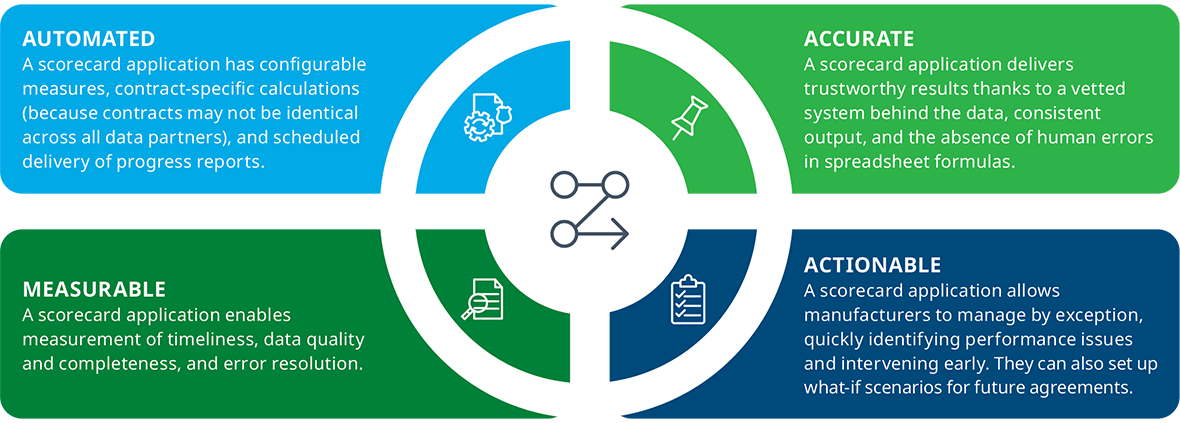Can your partner performance scorecard alert you to potential problems in real time and provide an opportunity to course correct? Accurate monitoring of partner performance is the most essential step in the process. In order to ensure insightful tracking, you need processes for acquiring high-quality data which meets the standards of your agreements.
Partner performance monitoring comes into play after your data strategy is established and contracts are signed with your data partners (typically specialty pharmacies). Working with a proven data aggregator for partner performance monitoring is key because you can rely on them to hold your data to negotiated standards, while having the confidence that they’re collecting meaningful, accurate patient data.
The deliverable with partner performance monitoring is a periodic scorecard, much like a progress report a student receives in school. A scorecard will evaluate performance parameters, identify compliance and non-compliance, report corrections and resubmissions, reveal trends in problematic areas, and allow for timely performance feedback back to your partners.
The scorecard design, setup, and delivery process

1. Contract design
This part of the process is all about ensuring that C-Suite dashboards showing the performance of data partners consist of high-quality data. Those key performance indicators (KPIs) depend on:
- The timely submission of patient data
- High-quality and complete patient data
- Fast resolution of any errors and resubmission of corrected records
The presence of data doesn't mean it's accurate or complete. Data elements, required or optional, must be evaluated for validity, accuracy, and completeness. Prompt evaluation and communication of sub-standard data is vital. As valuable a progress report for a student may be, so it is for your data partners.
2. Scorecard setup
Once the desired business goals have been agreed upon, a scorecard agreement establishes terms and conditions for optimal partner performance. The agreement defines what will be measured and how compliance will be evaluated:
- Contract compliance terms
- The grading system (What is compliance versus non-compliance)
- Fee calculations
Data fees are negotiated within a fair market value range between the manufacturer and the partner with performance ranges determining resulting fees.
For example, a monthly data quality score may be tiered to align performance to payment:
- 95%-100 = no reduction in fees
- 85%-94% = a 5% reduction and so on.
The scorecard must allow manufacturers to set up different fee schedules for each partner as needed.
3. Compliance monitoring
Once the scorecard design and setup are complete, early notification and intervention allow for issues to be resolved in a timely manner. Compliance monitoring can identify a systematic issue, or just a one-off error that fell through the data provider's quality check process. This is where the scorecard (or progress report) deliverable comes in.
Compliance monitoring lets manufacturers:
- Aggregate the facts
- Get early notifications and intervene early
- Identify non-compliance
- Waive issues for business exceptions
- Derive payment and reductions
- Make informed decisions
Being able to course-correct before issues like data quality becomes problematic is beneficial to both the partner and the manufacturer. Timely progress reports allow partners the opportunity to efficiently correct errors while removing any ambiguity or surprises for the partner at the end of the reporting period.
The benefits of configurable, yet automated scorecard application
Many manufacturers tend to choose Microsoft Excel for their scorecard tool, but relying on spreadsheets means relying on the individual maintaining them. When the person responsible for maintaining and calculating those scorecards moves on, they take their institutional knowledge with them. The right scorecard application reduces your dependence on a person, while providing an automated, accurate, measurable, and actionable process.

Good scorecards make good partners
At the end of the day, partner performance monitoring is more about working together with your data partners than grading them — just as a teacher gives progress reports to help a student learn and improve. Having the flexibility to configure different scorecards for different data partners, give partners the chance to correct errors during the grace period, and providing a transparent compliance evaluation process will foster a good business relationship between you and your data partners.
Earn an A+ by learning how the right scorecard design, setup and delivery process will make your scorecards automated and easy to understand. View the short Partner Performance Monitoring video.









